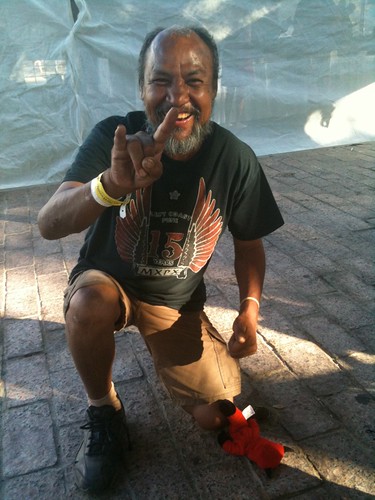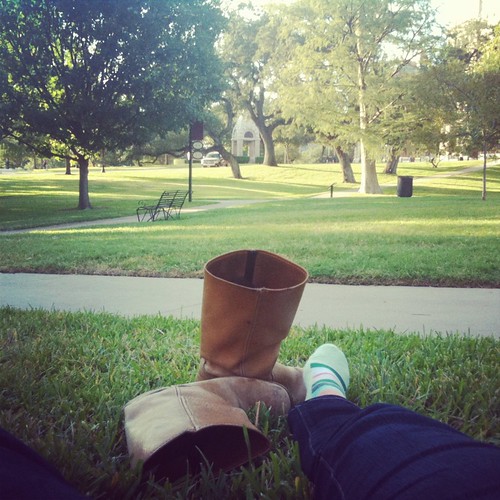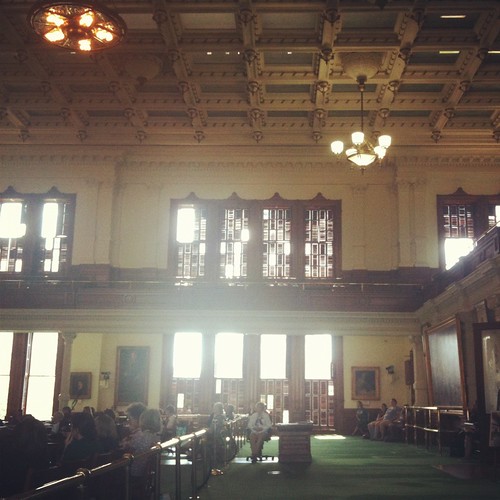-
a different kind of mystery at the book festival
All of the post-menopausal women from a 30-mile radius had descended upon the Senate Chamber. The event? A panel discussion among four authors about women changing their lives at the halfway mark. It was called “Take Two: Women on a New Path” and the venue was the Texas Book Festival a couple weeks ago. Now, not every attendee was a post-menopausal woman – I was there, for instance – but that demographic was the clear majority. As the panelists were settling in front, stragglers continued to fill the peripheral seats in the auditorium. From my perch on the side-wall pews where the press corps usually sit during the legislative session, someone caught my eye. A youngish guy, alone, passed me to sit further down, closer to the front. I half smiled, wondering how long it would take for him to realize that he was in the wrong chamber – the Civil War session was in the House Chamber, not the Senate. Oh well, I thought, he’ll figure it out soon enough.
Then the panel started and the moderator introduced all of the authors, briefly describing their works. One by one she went down the line, highlighting their extraordinary paths, brave journeys and amazing work (throw in your own cliché here) as women, women authors and women authors writing about women and their women’s experiences and relationships. By this point there was no mistaking the fact that estrogen and ovaries were on display here – not just display, they were being banged over the audience’s head with a two by four. And yet, the guy remained in his seat. More than that – he was following the panel with rapt attention. What the fuck?
Ten minutes into the panel my feminine-mystique-gushing threshold had just about peaked. At the same time my curiosity about why the random guy was there started winning more and more of my attention. I scanned the crowd for other men. From where I sat I counted about 15 salt and pepper masculine heads – clearly in co-attendance with their wives – out of the 200 plus attendees. This sideliner was definitely an outlier. The only possible explanation I could conceive of was that A) his mother or aunt was one of the panelists (but wouldn’t he have been sitting closer to the front?) or B) he really had meant to go to the Civil War panel but was too polite to get up and leave (but other people got up and left…) or C) he was a media consultant hired by one of the authors to help boost her author platform and was there to gather data (but no notebook or laptop.)
Finally, I decided I couldn’t listen to the moderator fawn anymore and developed acute onset literary Civil War interest, therefore compelling me to check out the House panel. But I couldn’t leave without finding out why that guy was there. I tore off a page of my notebook and scribbled: “Hi. I’m a writer. I’m writing a blog post about the Book Festival and I’m so curious about why you are at this panel. If you wouldn’t mind answering a few questions, please e-mail or call me. Caitlin.” I folded the note up around my business card, stood up, walked up to him, handed it over, then slithered out of the chamber. Who does that?
My phone rang halfway through the “Prophet’s Prey: My Seven-Year Investigation into Warren Jeffs.” A Chicago number left a voicemail. When I could finally pull myself away from the polygamist-chasing bounty hunter I listened to the message. His name was Kevin and he’d be happy to talk. After a few text back and forths we agreed to meet in the A-F section of the Book Tent.
As we made our way to a bench to talk I apologized for accosting him with such a random question and thanked him for responding. He said it was no problem – he has to talk to journalists a lot. About his book panel participation proclivities? This was getting even weirder. No, about his job for Wall Street Journal financial writers. Oh. He has one of those jobs he could spend all day explaining to you and the following morning all you’d be able to remember was “something about mutual funds,” or at least that’s what happened for me. Was it wrong for me to think that I had juicier scoop than the WSJ reporter?
It didn’t turn out to be that juicy, but it was still worth hearing about. He admitted that he had thought the panel was going to be a bit different – he was interested in hearing about mid-life transitions, not focusing so much on the female part. He soon realized that it was closer to a quilting bee than a life science convention, but stayed anyway. “It was really interesting to be there to hear women talking to women,” said Kevin. “I felt like I was privy to this world that men don’t usually get exposed to.” I said that men are exposed to it a lot, they just don’t generally listen that much, but had to remind myself it was an “interview” and not to battle age old relationship issues with my subject.
I asked if the grandmotherly woman sitting next to him – who I had seen him talking to – asked him why he was there. “No, she didn’t. Well, I guess maybe…she asked who I knew on the panel, which I thought was kind of weird.” See!!! I knew I wasn’t the only one trying to connect the dots around his attendance! The grandmother might have been more subtle than I was, but we were on the same trail. He said he didn’t really notice that he was one of the only guys there until I passed him the note. He looked around and wondered, “Why the hell am I here?” But he still didn’t leave. He was learning. Ruth Pennebaker, a novelist and author of the great blog “The Fabulous Geezersisters,” was on the panel and said that she thought that the mother-daughter dynamic was the most complicated relationship. “I never really thought about that before, it’s interesting.” Something about his generous and genuine appreciation of the event made me take on a post-feminist Camille Paglia-type persona. “What about fathers and sons?? How about mothers and sons?? Now that’s complicated.” The devil’s freaking advocate in the most ridiculous of places.
To his credit, he wasn’t completely over-awed by the experience. The nauseating adulation of the moderator was not lost on him – he compared her to James Lipton of Inside the Actors Studio. Exactly.
In the midst of our conversation a seemingly disoriented homeless man came into our sphere and tottered onto the curb after a few spastic moves. I noticed that he had a hospital ID bracelet on and worried that he had checked himself out a bit early. When I saw him list to one side I leapt up to see if he was okay. I have an long-standing fear that I’ll have to resuscitate someone and critically come to terms with the fact that I don’t remember anything from the CPR classes I’ve taken. Hoping to get to him before he passed out or had a fit, I crouched down and put my hand on his shoulder, asking if he was okay. He slowly turned to me in his slump, holding his head in his hands. “All I can think about is how delicious a Wendy’s Frosty would be right now.” As he finished he lifted his head and sparkled his eyes at me with a wide grin. I was less worried, and more than a bit charmed, but pointed to the bracelet and asked if they knew he was out. “Yes, thank you, nurse.” I told him I wasn’t a nurse but would give him the dollar for the Frosty.

When I came back to the bench to resume the interview with Kevin, the homeless guy reappeared, energized. “And now, I’m going to sing for you!!” He launched into some pretty rough approximations of the Beatles “Revolution,” a Creedence Clearwater song that Kevin recognized and an original composition that ended almost before it started. After he ambled off towards Wendy’s, Kevin wondered aloud if he was a Vietnam Vet – he looked like he was from that era.
Thinking about whether he was a Vet reminded me of the first Texas Book Festival I attended. I had gotten lost in the infamously labyrinthine hallways of the State Capitol extension and gave up on finding any of the panels I had carefully highlighted on my program. Anxious to just see something before it was all over, I slipped into the first populated room I stumbled upon. A marine who suffered PTSD from his experiences in Iraq was talking about his years-long healing process, and the role that writing played in his recovery. I looked around and noticed many Desert Storm type camouflage uniforms. As Kevin had been in the women’s panel, I was the fish out of water. Someone could’ve easily passed me a note: What are you doing here? And, as with Kevin, though it wasn’t what I expected, I was exposed to a world that had been all but invisible to me at the time. I had just moved to Texas from Congo and though I knew we were at war, I found it oddly missing from American public life. But here it was. Soldiers were telling their war stories and their coming home stories. Sometimes it was hard to tell which was worse. The ravages they and their families endured during the long re-entry process reminded me of the seldom noted ripple effects of war I had seen in Congo. The effects on family, farming and village life that take years to reveal themselves and even longer to get better, long after the initial conflict has ended. It was a heavy discussion, but I was so glad I had happened into that random room.
Isn’t that always the case with festivals? So many times I’ve discovered a slice-of-life gem only because the thing I really wanted to go to was sold out. Films, music, books – whatever. It’s those unexpected plunges that have led me down the richest paths. And there I was, a couple Sundays ago, at the end of yet another festival getting to see the world from a different perspective. All those ladies, a curious stranger, a singing Frosty-fan and a question answered.






